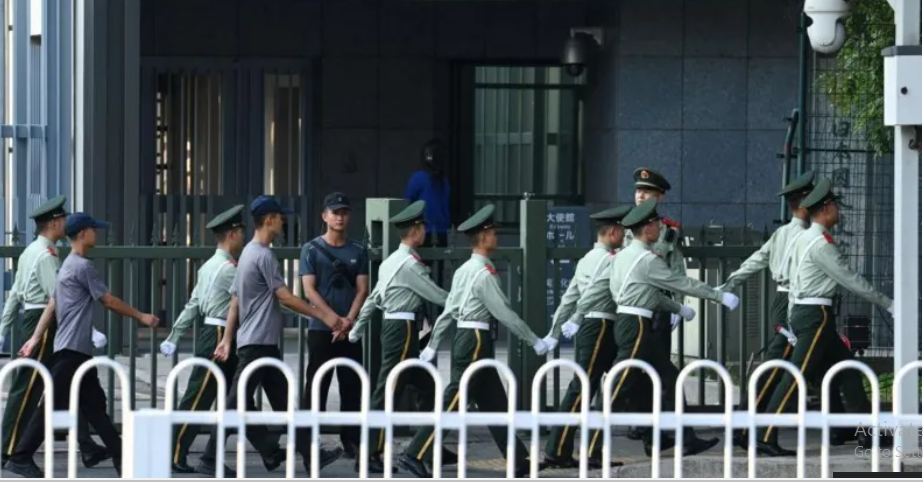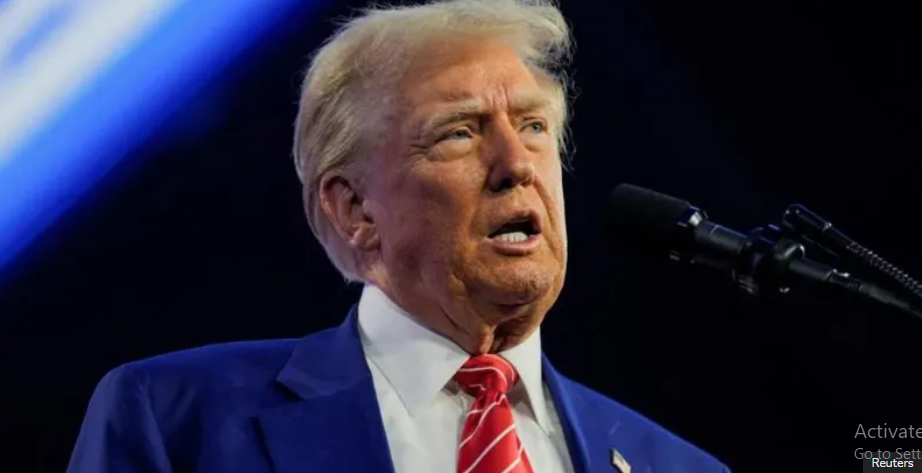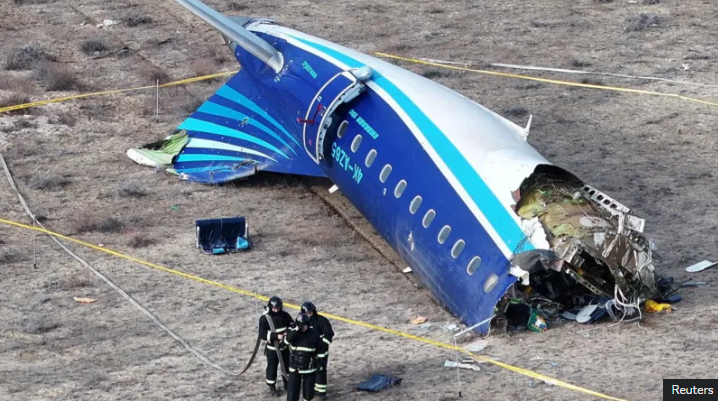Security has been stepped up outside Japanese schools and official buildings in China

The killing of a Japanese schoolboy in the Chinese city of Shenzhen has sparked worry among Japanese expats living in China, with top firms warning their workers to be vigilant.
Toshiba and Toyota have told their staff to take precautions against any possible violence, while Panasonic is offering its employees free flights home.
Japanese authorities have repeated their condemnation of the killing while urging the Chinese government to ensure the safety of their citizens.
The stabbing of the 10-year-old boy on Wednesday was the third high-profile attack on foreigners in China in recent months.
In a statement issued to the BBC, electronics giant Panasonic said it would “prioritise the safety and health of employees” in mainland China in the wake of the latest attack.
Panasonic is allowing employees and their families to temporarily return to Japan at company expense, and is offering a counselling service as well.
Toshiba, which has around 100 employees in China, has urged its workers “to be cautious of their safety”.
The world’s biggest car manufacturer Toyota, meanwhile, told the BBC it was “supporting Japanese expatriates” by providing them with any information they might need on the situation.
Japan’s ambassador to Beijing has also urged the Chinese government to “do its utmost” to ensure the safety of its citizens.
Meanwhile on Thursday, Japanese Prime Minister Fumio Kishida called the attack “extremely despicable” and said Tokyo had “strongly urged” Beijing for an explanation “as soon as possible”.
Some Japanese schools in China have contacted parents, putting them on high alert in the wake of the stabbing.
The Guangzhou Japanese School cancelled some activities and warned against speaking Japanese loudly in public.
Some members of the Japanese expatriate community in China have told the BBC they are worried about their children’s safety.
One man, a 53-year-old businessman who has lived in Shenzhen for nearly a decade, said he would be sending his daughter back overseas to university earlier than usual.
“We always considered Shenzhen a safe place to live as it’s relatively open to foreigners, but now we are all more cautious about our safety,” he said.
“Many Japanese people are deeply concerned, and numerous relatives and friends have reached out to check on my safety.”
Getty Images The Japanese flag flying at half-mast outside the Japanese embassy in Beijing on 19 September 2024.Getty Images
Japanese communities across China are mourning the killing in Shenzhen
Chinese officials in Shenzhen said they were “deeply saddened” by the incident and had started installing security cameras near the school by Thursday morning.
“We will continue to take effective measures to protect the life, property, safety and legal rights of everyone in Shenzhen, including foreigners,” they were quoted as saying in the Shenzhen Special Zone Daily on Friday.
An editorial in the state-affiliated newspaper lambasted the suspected killer, saying “this violent behaviour does not represent the quality of ordinary Chinese people”.
On Friday, locals began laying flowers at the gate of the Japanese school in Shenzhen.
“It is really sad. It shouldn’t be like that,” a Shenzhen local told Singaporean news outlet The Straits Times.
Another, a retired teacher, said: “This child, no matter which country he is from, is the hope of a family, and of a nation.”
‘Isolated incident’
CCTV A passport-style photo of Hu Youping. She has shoulder length brown hair and is wearing a red turtle neck jumper and a black jacket.CCTV
Chinese national Hu Youping died trying to restrain a knife attacker who was targetting a Japanese woman and her son in Suzhou in June
As Shenzhen reels from the killing, more details have emerged from various news reports and official sources.
The incident happened at around 08:00 local time (00:00 GMT) on Wednesday outside the boy’s school, the Shenzhen Japanese School.
The boy – who Chinese police named only as Shen – was stabbed in the abdomen. He later died from his injuries in the early hours of Thursday morning.
The assailant, a 44-year-old man surnamed Zhong, was arrested on the spot.
He had a criminal record, having been arrested for “damaging public infrastructure” in 2015 and “interfering with public order” in 2019, according to state-controlled media in Shenzhen.
An eyewitness said the suspect did not attempt to conceal his face when carrying out the attack.
“He didn’t run away, but just stood there and was apprehended by the local police guarding the school,” the witness told Japanese public broadcaster NHK.
Chinese authorities have not revealed the exact motive, but have repeatedly called the stabbing an “isolated incident”, as they did for two previous incidents this year.
In June, a man targeted a Japanese mother and her child in the eastern city of Suzhou. That attack was also near a Japanese school and led to the death of a Chinese national who had tried to protect the mother and son.
It prompted the Japanese government to request about $2.5m (£1.9m) to hire security guards for school buses in China.
Earlier in June, four American teachers were stabbed in the northern city of Jilin.
Acrimonious ties
Eyes are now on the Chinese authorities and how they will assure Japanese communities that they are safe in China, while ensuring this does not turn into a major diplomatic crisis.
Ties between the two countries have long been acrimonious. For decades the two sides have clashed on a number of issues, ranging from historical grievances to territorial disputes.
Some have pointed out that the stabbing happened on the anniversary of the notorious Mukden Incident, when Japan faked an explosion to justify its invasion of Manchuria in 1931, triggering a 14-year war with China.
A former Japanese diplomat said Wednesday’s attack in Shenzhen was the “result of long years of anti-Japan education” in Chinese schools.
While diplomatic relations may often be strained, economic cooperation has always had a parallel steady existence, according to Japanese diplomats who have spoken to the BBC.
But the fact the attack took place in the cosmopolitan tech hub of Shenzhen may make both sides nervous.
Top Japanese firms in China warning their staff may raise questions about their presence there and what that might mean for economic relations between Tokyo and Beijing.
















